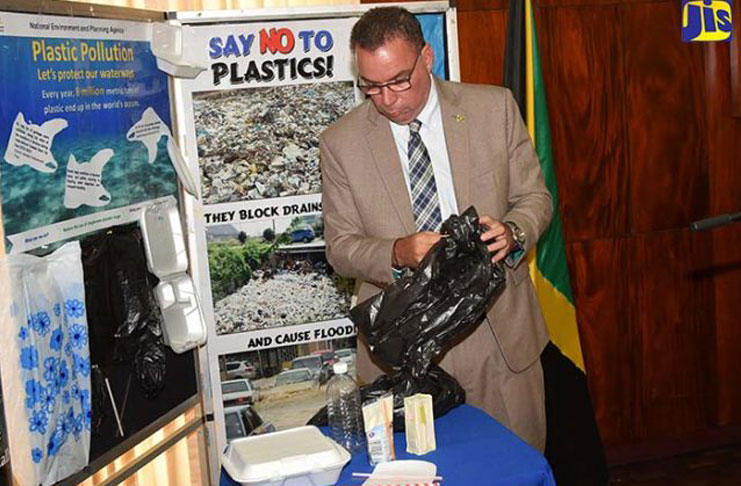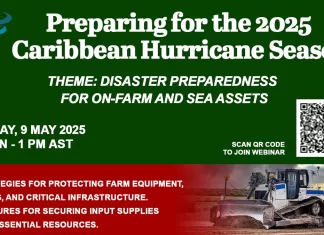Gov’t Bans Single-Use Plastic Bags, Plastic Straws and Styrofoam.
Starting January 1, 2019, the Government will be imposing a ban on the importation, manufacture, distribution and use of specific categories of plastic packaging materials.
These include single-use plastic carrier/shopping bags; expanded polystyrene foam, commonly referred to as styrofoam; and plastic drinking straws.
Minister without Portfolio in the Ministry of Economic Growth and Job Creation, Hon. Daryl Vaz, who made the disclosure at a press conference at Jamaica House on Monday (September 17), said the restriction has become necessary due to the fact that “Jamaica is literally inundated with all types of plastic”.
These items, he said, are improperly disposed of and are causing increasingly harmful effects to human as well as animal life.
Mr. Vaz explained that the restriction on single-use bags applies to carriers with dimensions at and below 24 inches by 24 inches (24”x24”), and includes bags commonly referred to locally as ‘scandal bags’ and ‘T-shirt bags’, which are used primarily in the retail and wholesale trade.
He noted that the ban will not apply to bags used to maintain public health or food-safety standards, such as those utilised to package raw meats; flour; sugar; rice and baked goods, such as bread.
“With regard to single-use shopping bags made of polyethylene, commonly branded by retailers, the manufacturers and importers of such products must apply to the National Environment and Planning Agency (NEPA) for limited exemptions. These applications will be considered on a case-by-case basis for continued manufacture and importation, allowable not later than January 1, 2021,” he informed.
“Consumers are encouraged to utilise reusable carrier bags, particularly those produced by local enterprises,” he said.
Mr. Vaz said the Government will work with the Development Bank of Jamaica (DBJ) and the Ex-Im Bank to look at assisting local bag-making companies to reconfigure and/or retool in order to manufacture more environmentally safe products.
As it relates to the ban on styrofoam, he said that this applies to importation of the product for use as food and beverage containers.
“The local manufacture and distribution of polystyrene foam for use as finished goods in the food and beverage industry will be banned as at January 1, 2020,” he said.
He indicated that the use of polystyrene for the packaging of food items such as raw meats will be exempt, and producers who utilise such packaging must apply to NEPA for limited exemptions.
“The industry is encouraged to manufacture/distribute paper-based and other environmentally friendly alternatives for the domestic market,” Mr. Vaz said.
Meanwhile, the Minister said the importation of plastic straws attached to lunch juice boxes and drink pouches will be banned as at January 1, 2021. He said there will be no restriction on wax-lined paper straws or other non-plastic straws.
Mr. Vaz said it is recognised that drinking straws made from alternative materials such as paper or bamboo are not always suitable for the medical sector and persons with disabilities, and exemptions will be examined in consultation with key stakeholders.
He noted that the guidelines for application for exemptions will be developed by NEPA in consultation with the relevant public-sector agencies.
“These guidelines will be posted on the Jamaica Information Service (JIS) and NEPA websites as well as circulated to the affected private-sector stakeholders,” he indicated.
Mr. Vaz informed that the Government has been examining the problem caused by the improper management of single-use plastics at the macro-level for some time now, noting that the matter was brought to the fore by a motion on the subject moved by Government Senator Matthew Samuda in the Upper House.
Consequently, a multisectoral working group was establishment by the Cabinet, which was chaired by Dr. Paris Lyew-Ayee Jr. and involved industry players.
“Since that time, a lot of work has been done, not only by the working group but also by the Jamaica Manufacturers and Exporters’ Association (JMEA), the Caribbean Policy Research Institute (CaPRI) and the Jamaica Environment Trust (JET) on this issue. The Government has been having positive discussions with key stakeholders, including the JMEA, to arrive at a consensus on the measures to be implemented,” he said.





